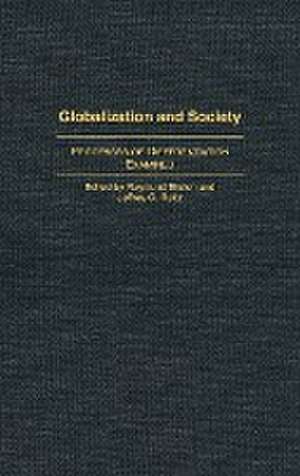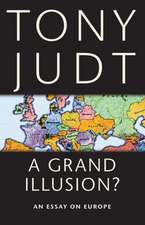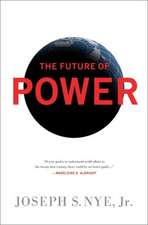Globalization and Society: Processes of Differentiation Examined
Editat de Raymond Breton, Jeffrey G. Reitzen Limba Engleză Hardback – 29 dec 2003 – vârsta până la 17 ani
Preț: 367.69 lei
Preț vechi: 481.45 lei
-24% Nou
Puncte Express: 552
Preț estimativ în valută:
70.36€ • 73.64$ • 58.56£
70.36€ • 73.64$ • 58.56£
Carte tipărită la comandă
Livrare economică 31 martie-14 aprilie
Preluare comenzi: 021 569.72.76
Specificații
ISBN-13: 9780275979638
ISBN-10: 0275979636
Pagini: 336
Dimensiuni: 156 x 235 x 31 mm
Greutate: 0.65 kg
Ediția:New.
Editura: Bloomsbury Publishing
Colecția Praeger
Locul publicării:New York, United States
ISBN-10: 0275979636
Pagini: 336
Dimensiuni: 156 x 235 x 31 mm
Greutate: 0.65 kg
Ediția:New.
Editura: Bloomsbury Publishing
Colecția Praeger
Locul publicării:New York, United States
Notă biografică
RAYMOND BRETON is Professor Emeritus of Sociology at the University of Toronto.JEFFREY G. REITZ is the R.F. Harney Professor of Ethnic, Immigration, and Pluralism Studies, and Professor of Sociology at the University of Toronto.
Cuprins
AcknowledgmentsIntroduction: Rethinking the Impact of Globalization Processes-Differentiation As Well As Convergence by Raymond Breton and Jeffrey G. ReitzInternational RelationsTrends in Inequality: Toward a World-Systems Analysis by Roberto Patricio Korzeniewicz, Timothy P. Moran, and Angela StachU.S. Foreign Policy and the Foundations of World Order by Louis W. PaulyCosmopolitan Ghosts and Resistance Communities: Québec City's Sumit of the Americas and the Making of Transnational Subjects by André C. DrainvilleLabor Relations and Social InequalityGlobalization and the Great U-Turns: Income Inequality Trends in 16 OECD Countries by Arthur S. Alderson and François NielsenWorkplace Change in the New Economy: Getting Lean and Flexible by James RinehartReviving the Labor Movement: Rank-and-File Mobilization in the United States, Britain, and Germany by Lowell TurnerCulture and Social ValuesTechnological Change, Cultural Change, and Democracy by Ronald InglehartPolitics versus Markets: A Note on the Uses of Double Standards by Axel van den BergReligions in Global Society: Transnational Resource and Globalized Category by Peter BeyerInformation and Knowledge InstitutionsScience, Technology, Education, and Economy in Centers and Peripheries by Thomas SchottReinventing Birmingham, England, in a Globalized Information Economy by Frank WebsterThe Penetration of Profit Taking in Higher Education and Academic Freedom by Sheila SlaughterNationalism and Migration, Ethnicity and LanguageMigration and Community Formation under Conditions of Globalization by Stephen CastlesEducational Expansion and the Employment Success of Immigrants in the United States and Canada, 190-90 by Jeffrey G. ReitzNationalism and the New Economy by John A. HallPolitics and Democratic RepresentationChanging Citizenship Regimes in Western Europe by Jane JensonSome Political Consequences of Economic Globalization by Albert BretonThe Future of the Welfare State: Crisis Myths and Crisis Realities by Francis G. CastlesIndexContributors














